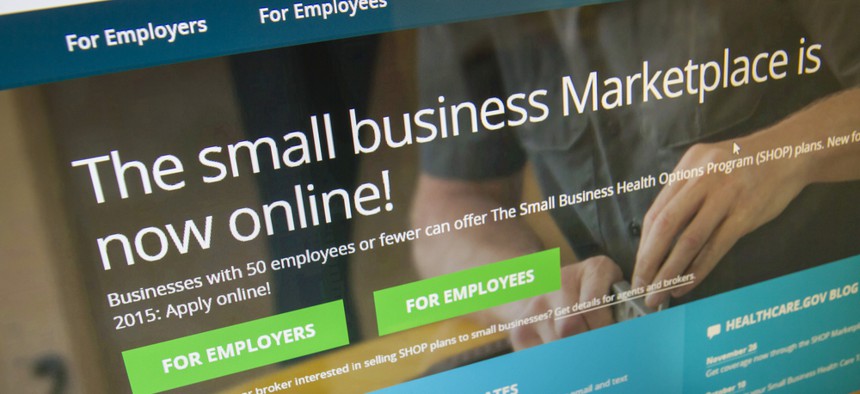
txking / Shutterstock.com
Obamacare Could Be in Trouble if It Drives Businesses From Insurance Market
Affordable Care Act rules affecting more small businesses next year could drive them to self-insure.
Next year, Obamacare insurance rules will start to apply to a new pool of small businesses, and experts say that could lead many of them to take a look at insuring themselves—that is, stepping outside of the health care law's market and supplying their own health coverage. If they do, the fallout could be significant.
At the moment, so-called "self-insurance" is largely confined to large employers; the majority of companies with 200 or more employees cover their workers that way. In theory, it's simple: They pay directly for their employees' health care, rather than buy insurance.
Because of the financial risk involved—a big medical claim for one person, like a terminal diagnosis or serious accident, can put a significant burden on the company—small businesses have generally not considered self-insurance to be a viable option. Only 15 percent of businesses with fewer than 200 workers currently cover their workforce that way, according to the Kaiser Family Foundation.
But that calculus might start to change next year because of Obamacare's regulations.
In 2016, the law's definition of a small business will increase from 50 workers or fewer to 100. That means a new pool of businesses will be subjected to some of the Affordable Care Act's insurance rules. In addition, many small businesses with fewer than 50 employees have been able to keep their noncompliant plans under the Obama administration's "keep-your-plan" fix, a rule that expires in 2017.
The worry is that the regulations will drive companies with younger and presumably healthier workers to take a hard look at self-insurance. If they decide to go that direction, it would leave companies with older and sicker workers in the insurance risk pool, which could drive up prices.
Under Obamacare's rules, the small-business insurance market will be treated much like the individual market. Insurers will be limited, for example, in how much they can vary premiums between different companies depending on their employees' age and health. This is supposed to protect companies: A worker who gets a cancer diagnosis won't send premiums soaring for everybody else in the company.
But if you're a company with a young and healthy workforce, you had been benefitting from the old system and insurers were likely giving you inexpensive rates because you were cheap to cover. Those businesses could see their insurance costs go up once the Obamacare rules start affecting them.
And it's those companies that are most likely to find self-insurance appealing.
"Small employers have been talking more and more about self-funding," said Ken Jeffries, a senior consultant at Mercer, a leading benefits consulting firm. "It's getting to the point where they're comfortable with taking on that risk."
Jeffries specifically tabbed the ACA's community-rating provisions as something that will likely lead businesses to explore their self-insurance options.
"If you're a small employer that has a relatively healthy workforce, the insurers are going to have very little flexibility in giving them preferred rates. They're going to have to be locked in with community rating," he said. "I think it's those employers that may be on the smaller side but are younger and healthier that are going to look to try and see if there's a way for them to figure how to go self-funded."
That would mean a lot of things. Those companies would now bear the risk of self-insurance, meaning one of their young and healthy employees getting in a serious car accident could put the business at financial risk. There is also a whole industry that sells "stop-loss insurance" to self-insured companies. It protects them from particularly expensive claims (or years with a lot of claims). There have been some discussions among state insurance commissioners about changing the way that coverage is regulated and treating it more like regular health insurance, but it isn't clear whether any action will be taken soon.
Then there is the fallout for the Obamacare market and the companies left buying coverage there. Just as the law's supporters worried that if too few young people signed up for coverage in the individual market, it would drive prices higher, the same principle would apply for small businesses, said Larry Levitt, vice president at the Kaiser Family Foundation.
But it's a change that he is expecting. "I think it's very likely to come," he said. "The payoff is too great for them to turn their backs."
In the long term, Levitt said, the impact on the market could be "quite substantial if a significant number of younger and healthier small businesses self-insure and pull themselves out of the risk pool."
With an estimated 40 million Americans working for firms with 100 employees or less, per theCensus Bureau, it is a significant market that could be affected.
"It has a real negative effect on small businesses that are buying insurance," Levitt said, "and it will feed negative perceptions of the law because it will certainly be pinned on Obamacare."
(Image via txking/Shutterstock.com)






